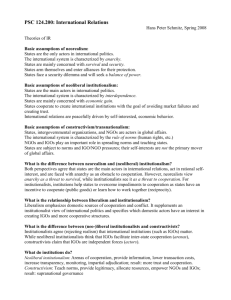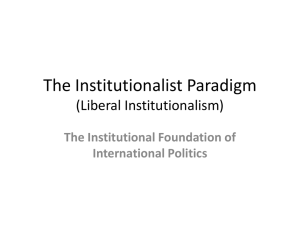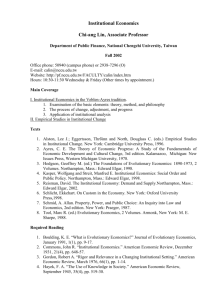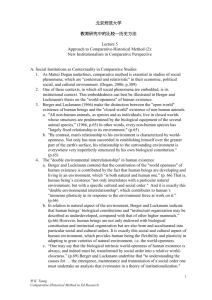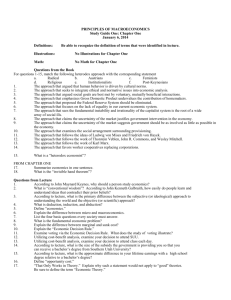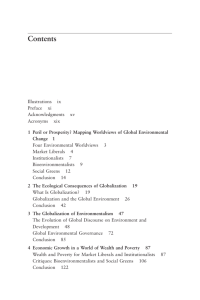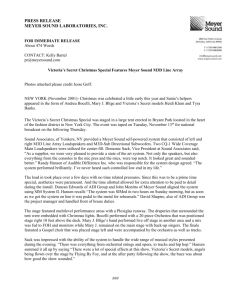Norms, culture, and world politics: insights from
advertisement
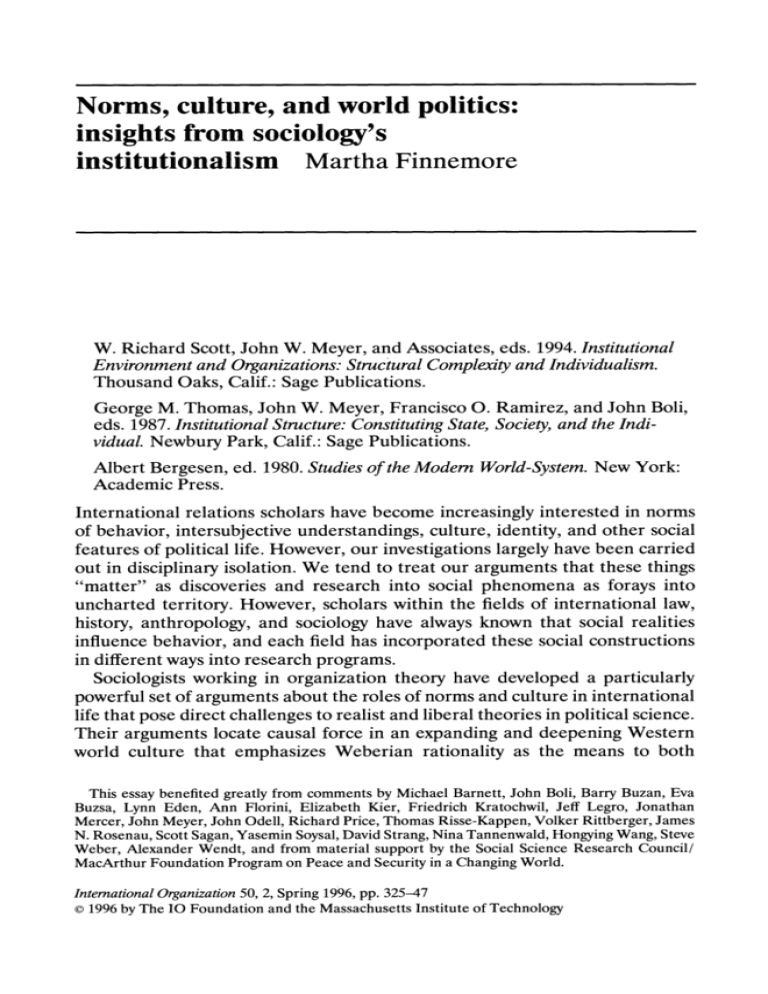
Norms,culture,and worldpolitics: insightsfromsociology's institutionalismMarthaFinnemore Meyer,and Associates,eds. 1994.Institutional W. RichardScott,JohnWV. and Individualism. Complexity Structural and Organizations: Environment ThousandOaks, Calif.:Sage Publications. George M. Thomas,JohnW. Meyer,Francisco0. Ramirez,and JohnBoli, State,Society,and theIndiConstituting Structure: eds. 1987.Institutional vidual.NewburyPark,Calif.:Sage Publications. New York: AlbertBergesen,ed. 1980.StudiesoftheModem World-System. AcademicPress. interestedin norms Internationalrelationsscholarshave become increasingly and othersocial culture,identity, understandings, of behavior,intersubjective largelyhave been carried featuresof politicallife.However,our investigations isolation.We tend to treatour argumentsthatthese things out in disciplinary "matter"as discoveriesand researchinto social phenomena as foraysinto However,scholarswithinthe fieldsof internationallaw, unchartedterritory. and sociologyhave alwaysknownthat social realities history,anthropology, influencebehavior,and each fieldhas incorporatedthese social constructions in different waysintoresearchprograms. Sociologistsworkingin organizationtheoryhave developed a particularly powerfulsetofargumentsabouttherolesofnormsand culturein international lifethatpose directchallengesto realistand liberaltheoriesin politicalscience. Their argumentslocate causal forcein an expandingand deepeningWestern world culture that emphasizes Weberian rationalityas the means to both This essay benefitedgreatlyfromcommentsby Michael Barnett,JohnBoli, BarryBuzan, Eva Buzsa, Lynn Eden, Ann Florini, Elizabeth Kier, FriedrichKratochwil,JeffLegro, Jonathan James Mercer,JohnMeyer,JohnOdell, RichardPrice,Thomas Risse-Kappen,VolkerRittberger, N. Rosenau, ScottSagan,Yasemin Soysal,David Strang,Nina Tannenwald,HongyingWang,Steve Weber, AlexanderWendt,and frommaterialsupportby the Social Science Research Council/ MacArthurFoundationProgramon Peace and Securityin a ChangingWorld. IntemationalOrganization 50, 2, Spring1996,pp. 325-47 ? 1996byThe 10 Foundationand the MassachusettsInstituteof Technology 326 InternationalOrganization justice, definedas equality,and progress,definedas wealth accumulation. These worldculturalrules constituteactors-includingstates,organizations, and individuals-and definelegitimateor desirablegoals forthemto pursue. World culturalnormsalso produce organizationaland behavioralsimilarities across the globe that are not easily explained by traditionalparadigmsin political science. Because theycall these culturalnormsand rules "institubythoseworkingwithin tions,"theapproachhas been named "institutionalist" it. and explores This essayprovidesan overviewof sociology'sinstitutionalism itsimplicationsforthe studyofworldpolitics.At theoutsetit shouldbe noted ways than do that sociologistsuse the term "institution"in very different emphasizingthe social rational-choicescholarsor historicalinstitutionalists, ratherthan structuraland constraining and cognitivefeaturesof institutions mean thatdespitesimilaritiesin labelfeatures.Incommensurabledefinitions ing,these approaches-all called institutionalist-havelittlein common.In or the fact,rational-choicescholarsworkingon positivetheoriesof institutions at all in the sociological economicsare not institutionalists new institutional sense (and viceversa).1 should interestinternationalrelations (IR) Sociology's institutionalism scholarsin politicalscience forseveralreasons. First,it challengesdominant paradigmsin political science directly.It providesa system-leveltheoretic withwhichto analyzeinternationalpoliticsand generatestestable framework hypothesesabout internationalbehaviorthat competewiththose of realism and liberalism.These hypothesespredictsimilaritiesin behaviorcaused by in commonglobalculture,whererealismor liberalismwouldexpectdifferences interests.The fact that situatedactorswithdifferent behaviorby differently explore their hypotheseswith data-intensivequantitative institutionalists methodsnotusuallyassociatedwithworkon normsand culturein IR butmuch admired by skepticsof cultural argumentsintensifiesthe institutionalists' challenge. Explanatoryclaims made by realists and liberals must address iftheyare to be persuasive. institutionalist alternatives institutionalist argumentsspeak directlyto a numberof theoretical Second, outsidethe confinesof the neorealist-neoliberal developed approachesbeing concernsabout debate thathas dominatedU.S. IR scholarship.Institutionalist the expansionof Westernworldcultureare sharedbyEnglishschool scholars the expansion of the West and the nature of what theyhave investigating termedinternationalsociety.2Institutionalists' argumentsalso lead them to investigateglobalizingphenomena and the growingpower of individualsin waysthatinvitecomparisonwiththe workof JamesRosenau, Michael Ziirn, 1. Jepperson 1991 provides an excellent discussion of the sociological understandingof see DiMaggio For comparisonsof the variousinstitutionalisms, and institutionalism. institutions and Powell 1991; and Hall and Taylor1994. 2. See Bull 1977;Bull and Watson1984; Gong 1984; and Buzan 1993. Institutionalism327 Ernst Otto Czempiel, and Philip Cerny.3Both the English school and treat these globalizationscholarsmay quarrel withthe way institutionalists withthe sweeping phenomena.Englishschool scholarsmaybe uncomfortable of the sociologists'arguments.Those interestedin the powerand determinism processof globalizationand individuationmaybe put offby the institutionalists' claim that this process happens in conjunctionwith,ratherthan at the can But in both cases these differences expenseof,increasingstate authority. throughcoordinatedresearch. and shouldbe settledempirically argumentsin political Third,while it sharessome featuresof constructivist richer and moredetailed much providesa science,sociology'sinstitutionalism Sociologistsspecifythesubstanthanhas constructivism. theoreticalframework more than simplyargue that social They do tive contentof social structure. structureis. Institutionalists' the social what tell us they structurematters; as having particular social structure) culture (the of world specification Westernand Weberiancomponentshas yieldedhypothesesthatcan be tested empirically;indeed, theyalreadyhave been tested in the large and growing researchprogram. institutionalist specificationof social structureis global and Further,the institutionalists' all-encompassing.It permeates all aspects of political and social life in all states. Political science research on norms and culture has tended to be structuredaround specificissue-areas and thereforeargues that particular have not made an norms matterin particularissue-areas. Constructivists integratedargumentabout how the various norms in differentareas fit together.This lack maybe a legacyof regimesscholarship,whichprovidedthe formuchearlyresearchon norms,since regimeswere theoreticalframework Withoutsuch an argumentabout the contentof a by definition.4 issue-specific cannot provide an alternativeto systemicsocial structure,constructivism systemictheories.The sociologistsclaim to have done this.As I will discuss in politicalscience have reason to be concernedabout below, constructivists butbecause thesociologitheirclaims-not because theyare beingoutflanked, and researchprogrammarginalizepolitics. cal specification incorporatesand endogenizeshistorical Fourth,sociology'sinstitutionalism changes ratherthan abstractingfromthem. The focus of most realist and liberalIR scholarsis on developinggeneralizedprinciplesof interactionthat applyregardlessof timeand place. Theiremphasisis on thewaysin which,for example,Thucydides'politicsare like those of Metternich,whichare in turn like thoseof HenryKissinger.The emphasisis on whatis the same overtime, Historicalchangecreatesanomaliesin theseanalyses;itis notwhatis different. are interestedin developinggeneralizations not partof them.Institutionalists about historicalchange.They emphasizethe ways in whichstates' goals and behaviorand even theirverynaturesare deeplyshaped by prevalentpolitical 3. See Rosenau 1990;Zurn 1995; Rosenau and Czempiel 1992; and Cerny1995. 4. Krasner1983,1. 328 InternationalOrganization ideas and social norms of a given time in history.Further,they offeran argument, albeita sketchyone, about thedynamicsof thischange. Finally,institutionalist argumentsabout global culture bear directlyon recentpolicydebates. Rather than a "clash of civilizations"emergingas the fundamentaldynamicoffutureworldpolitics,institutionalist researchprovides powerfulevidence of global culturalhomogenization.5 Scholars may quarrel about how to operationalizecivilizationand culture-indeed, theyare already have both an argumentand evidence to doing so-but institutionalists contributeto this-debate. They are less clear, however,about what cultural homogenizationimpliesfor global order and stability.I returnto this issue below. The firstsectionof thisarticleprovidesa briefoverviewof institutionalist argumentsand theirresearchprogram.To clarifythe natureand implications of these arguments,I contrastthemwithothersbetterknownto American has structural politicalscientists.While sociology'sinstitutionalism similarities to ImmanuelWallerstein'sapproachand sharessubstantiveinterestswiththe English school, it is fundamentallydifferentfrom both and from other argumentspoliticalscientistshave encountered.6 The second halfof thisarticleexploresthe implicationsof the sociological allowsus to approachforpoliticalscienceresearch.Sociology'sinstitutionalism ask questionsabout featuresofinternational politicsthatare assumedawayby otherparadigms.However,some of the answersit providesare not likelyto about politicalscientists.The articlecloses withsome recommendations satisfy ways in which politicalscientistscan engage and challenge the sociological approachthatmightbenefitbothdisciplines. Overviewofsociology'sinstitutionalism Culture and organizations Institutionalist argumentsdate fromthemid-1970swhena groupat Stanford Universityinterestedin cross-nationalanalyses of political and economic change began to explore the relationshipbetween formal organizational and culture.7Prevailingtheoriesabout bureaucraciesand organizastructures tions held that,indeed, culturehad littleimpacton those entities.In fact, formalbureaucraticorganizationscomprisedthe antithesisof culture;they were technical,rational, and thereforeculture-neutral.They transcended culture. 5. See Huntington1993; Ajami 1993; Bartley1993; Binyan1993; Kirkpatrick, Weeks, and Piel 1993; and Mahbubani1993. 6. See Wallerstein1974a; 1974b;and 1980. 7. For a good discussionof the intellectualroots of institutionalanalysissee DiMaggio and Powell 1991. Institutionalism329 The Stanfordgroupchallengedthatview.Prevailingtheoriesexplainedthe rise,form,and spreadofformalbureaucraticorganizationsin functionalterms. FollowingMax Weber,theconventionalwisdomheldthatrationalizedbureauway to coordinatethe and effective craticstructureswere the most efficient complexrelationsinvolvedin moderntechnicalwork.Expandingmarketsand complexmanagementtasks.Bureautechnologicalchangescreateincreasingly craticorganizationalformsmustalso thenexpandto coordinatetheseactivities acrossmoreand moreaspectsofsociety.Bureaucraticorganizationwas seen as the only way to divide labor, specifyresponsibilities,and institutionalize ways. coordinationand decisionmakingin rationaland efficient The problemwiththisviewwas thatbureaucraticorganizationshave spread even morequicklythanthemarketsand technologythatwere thoughtto have createdthe need forthem.Cross-nationalanalysesof politicaland economic change,especiallyin the developingworld,made it abundantlyclear thatthe worldwas beingbureaucratizedand organizedmuchfasterthan it was being Further,the linkbetweenformal developed economicallyor technologically.8 organizationalstructure-theblueprintforhowthebureaucracyis supposedto function-and the organization'sday-to-dayactivitieswas oftenveryloose. analysesOrganizationtheoristshad recognizedthisearlier,butcross-national especiallythose dealingwithdevelopingcountries-underscoredthe point.If then bureaucraciesdo notact accordingto theirrationalizedformalstructures, of rational formalstructurecannot be the reason for their the efficiency proliferation. The alternativeexplanationdevelopedbyMeyerand his colleaguesemphaof these organizations.Formal bureaucraticstructures sized the environment coordinatorsof did notspread as a resultof theirfunctionalvirtuesas efficient complex relationships(they may or may not be so) but because the wider environment supportsand legitimizesrationalbureaucracyas a social good. and havetheformtheydo notbecause theyare Organizationsexist,proliferate, butbecause theyare externally legitimated.9 efficient This is the entrypointforculture.The contentof thisexternalenvironment is cultural.The social values thatsupportand legitimatesome organizational formsand notothers,some social activitiesand notothers,are culturalvalues. Culturehad gottena bad name in sociologyformanyofthesame reasonsitgot self-described a bad name in political science. Part of the institutionalists' One way theydo thisis to missionis to reclaimcultureformacrosociology.10 make dominant Western culture the object of their study and thus to denaturalizefeaturesofsocial lifethatappear naturaland inevitableto mostof 8. The studiesin Meyerand Hannan 1979pointto thisconclusion. 9. The seminalessayoutliningthisargumentis Meyerand Rowan 1977.Earlyapplicationsofthe contextscan be foundin Meyerand Hannan 1979. argumentin cross-national 10. Thomas et al. 1987,7. 330 InternationalOrganization us because thisis our own culture.We are so deeplyembeddedin it thatit is hardto see beyondit. is not an unproblematicattributeof bureaucratic Western-style rationality organizations,as mostorganizationtheoristsassume. Rationalityis a cultural and progressand othercultural"goods" value. It is associatedwithmodernity of contemporarysocial life. Ironically,people create rational bureaucratic organizationsforotherthanrationalreasons.When facedwithsocial workto be done, people forma committeeor create a bureaucracybecause it is the appropriatesociallysanctionedwayto addressa social task;it is "the thingto do." We continueto formcommitteesand bureaucracieseven when we are skeptical about their effectiveness,indeed, even as we deride them as ineffective and useless in public and politicaldiscourse.1"There is an almost ceremonialaspect to bureaucraticorganizationin modernlife. Bureaucratic withit is "ceremony"in theinstitutionrationality is "myth"and conformance alistview.12 Since JohnMeyerand Brian Rowan's articulationof the basic argumentthat externalculturallegitimationratherthan task demands or functional needs explains much if not most of organizationalbehavior-institutional argupaths empirically.The institutionalist analyseshave followeddifferent ment is not necessarilyinternationalin nature,and much of the work and subsequenttheorizinghavebeen done byscholarslookingat nationaland even have mapped normativeand very localized phenomena.13Institutionalists thatshape the behaviorof organizationsin professions culturalenvironments in such as mentalhealth,in the arts and culture,in municipalgovernments, and in the creationof whole businesssectors.14 Hownationalgovernments, ever,Meyerand his colleagues have continuedtheirinterestin cross-national and global phenomena. In fact, the logic of the argumentthat cultural environments operateon organizationsat all levelssuggeststhatlocal environmentsare alwaysembedded in largernationalor transnationalones. Thus, if one were to push institutionalist scholarsinvestigating localized organizational behaviorto specifythe originsor dynamicsof theirlocal environments, they would have to look ultimately to global phenomenaof the kindMeyerand his colleagues investigate.In this substantivesense, the global institutionalist argumentsforma backdropfortheothersand logicallysubsumethem.It is this international-level argumentthat challengesIR scholarsin politicalscience mostdirectlyand is thefocusof thisessay. 11. For an explorationof thisparadox in the contextof effortsto reformU.S. governmental see Marchand Olsen 1989,especiallychap. 5. bureaucracyoverthepast century, 12. Meyerand Rowan 1977emphasizethisin theirtitle. 13. Amongthosewho have been particularly influential are authorscontributing to Powell and worksincludeScott1981; Meyerand Scott1983; and Scottet al. DiMaggio 1991.Otherinfluential 1994. 14. See Meyer 1994; DiMaggio 1988; McNeely 1993; Tolbertand Zucker 1983; Dobbin 1994; Suchman1994;and Dobbin 1992. Institutionalism331 The contentand consequences of the world cultural environment see expandingacrossand integrating The worldculturethatinstitutionalists literaturecontainsno theglobe is a Westernculture.Althoughinstitutionalist singleextendeddiscussionof eithertheoriginsor thecontentofglobalculture, thefollowingpictureemergesfromseveralsourcesoftencitedbyinstitutionalIt has its originsin Western Christendomand Western ist researchers.15 capitalism and has spread as the West has expanded economicallyand politically.In doingso it has bureaucratized,marketized,and individuatedthe worldin waysthatare not expectedor easilyexplainedbyothersocial science In fact,Meyerarguesthattheexpansivenatureofitsideologiesand arguments. featureof Westernculturewithrootsin medieval cultureis itselfa distinctive Christendom. Theoriesor ideologieslikethosefromtheWestthatmakeclaims about all people and all places have much more expansivepotentialthan like that of the Balinese particularizedand localized ideational frameworks Geertz.16 documentedbyClifford theater-state As notedearlier,one centralfeatureofWesterncultureis thevalue itplaces mean simply institutionalists and purposiveaction.Byrationality, on rationality of action in termsof ends and means. Rational action, in the structuring Westernculturalterms,is not onlygood, it is natural.However,one does not before or area-studiesliteratures history, haveto readveryfarin anthropology, is notso obviousor natural purposiverationality thatWestern-style discovering to non-Westerners (or, indeed, to Westerners,thoughtheywould be loath to social action,notablyin terms admitit). There are manyotherwaysto structure of roles, rituals,duties, and obligations,that are not consequentialistin a guidesto social behaviornonetheless.17 Westernrationalwaybut are effective Progress and justice are the two ends toward which Western societies structuretheirrationalaction.Throughhistoricalexperiencethese two goals have come to be definedin particularways.Progressor "success" is defined whichforindividualsusuallymeansincreasingwealthand forstates materially, means increasinggrossnationalproduct.Justiceis usuallydefinedin termsof equality. Rational means to both these goals, in the Western cultural in contributing are bureaucraciesand markets.Claimsof efficiency framework, to increased wealth and progresslegitimizeboth. Both locate authorityin impersonalrules that can be legitimatedin termsof equality-equal access, equal opportunity. expandinggrossnationalproduct The Westernculturalagenda ofpromoting and equalitythroughexpandingand deepeningbureaucraciesand marketshas are in Thomas et al. 1987 and Bergesen1980. 15. The besttreatments 16. See, respectively, Meyer,Boli, and Thomas 1987,30; and Geertz 1980. view,see 17. For a discussionof alternativelogics of action that supportthe institutionalist Marchand Olsen 1989,chap. 2. 332 InternationalOrganization spread to dominate global political and social life over the past several centuries.One prominentartifactof Western cultural dominance is the bureaucraticstates.Conventional organizationof theworldintoWestern-style argumentsabout the rise of the modern state emphasize its functional revenueto explainitssuccessat advantagesat providingsecurityand extracting This may(or maynot) be theexpenseofotherformsofpoliticalorganization.18 trueof the riseof the statein Europe, but it does not explainthe expansionof statesto all cornersof theworld.The modernbureaucraticstate Western-style has become the sole legitimateformof political organizationin the world; virtuallyall othershave been eliminated.Empires,colonies,feudal arrangements,and a varietyof otherformshave become extinctand, perhaps more politics.19 unimaginablein contemporary important, This is nota functionalresultforat least tworeasons.Extremevaluationon statehood as the only legitimateformof political organizationmakes many to resolve.It means thatself-determination kindsof politicalconflictdifficult requireshavinga state.Ifyou are not a state,you are nobodyin worldpolitics, and nationalliberationgroupsunderstandthis.This createsan all-or-nothing dynamic in many conflictsthat might be more easily resolved if other organizationalformswere available. even Second, this valuation on statehood has created many ineffective, failed,states.Far fromhavingemergedas "lean, mean competitors"fromsome organizationalselectionprocess,thestateas an organizationalformhas had to be imposedand, indeed,proppedup in manypartsof theworld.The factthat hopelesslyfailed states still must be reconstructedas states rather than reorganizedin some otherway,forexampleas colonies,underscoresthestrong ofotherpoliticalforms.20 culturalsupportforstatehoodand theillegitimacy bureaucratic Drawingon theirargumentabout Westernculturelegitimating outcomesas institutionalists explainthese seeminglydysfunctional structures, the resultof externalculturallegitimationratherthaninternaltaskdemands. Statesexistin manyplaces notbecause theyare good at whattheyare supposed to do (providesecurityand economicgrowth,promoteequality)butbecause a largerworldculturesupportsthem. The other central feature of Western culture with importantpolitical and expandingnotionsof individualrightsof all consequencesis individualism sorts-human rights,citizenrights,women's rights,children'srights.Meyer makesa powerfulcase thatWesternculturalvalues have createdtheindividual as an autonomousactor and describes the processes wherebyattributesof individualpersonhood have become elaborated and expanded.21There is thatemphasizes morerecentargument 18. See Tilly1975;and Skocpol1979.For another, see Spruyt 1994. andexchange dominance, coercion military research on this empirical see Meyer1980.For extensive 19. For a moredetailedargument, see Strang1991;1990. phenomenon, 1990. onthispointseeJackson argument 20. Fora related, albeitnoninstitutional, 21. Meyer1987. Institutionalism333 societies around atomized nothinginevitableor obvious about structuring individuals.Many othersocieties and cultureslocate social value and moral in the family,the tribe,or some other social unit. Western responsibility individualismis distinctive,and its culturallogic leads to some distinctive it leads to the expansionof individuallegal behaviorpatterns.Substantively, rights,noted earlier. Analytically,it leads Western social science to treat irreducible,autonomousactorswho knowwhat individualsas unproblematic, theywantindependentofsocial or culturalcontextand,indeed,who createthe claimis theopposite-that theindividualas social context.The institutionalist autonomoussocial actoris a product,nota producer,of societyand culture. Sociology's institutionalismis thus radically differentfrom realism or liberalismin IR in that it falls on the structuralor holist side of the priorto is ontologically social structure debate.22Analytically, agent-structure and generativeofagents.It createsactors;itis notcreatedbythem.In contrast, most argumentsin IR and politicalscience begin withagents.They take as set of interests-states pre-specified givensome set of actorshavinga similarly pursuingwealth or security,membersof Congresspursuingreelection,firms Macro-levelsocial nationalleaderspursuinga place in history. pursuingprofits, structureis explained as the consequence of their interaction.Even in realism, like KennethWaltz's structural approachesthatIR calls "structural," the internationalstructureis an epiphenomenonof the power capabilitiesof and interactionamong individualactors; it has no independentontological status.It constrainsonly;it is notgenerative.23 analysis,the social structureis ontologicallyprimary.It is In institutionalist thestarting pointforanalysis.Its rulesand values createall theactorswe might considerrelevantin internationalpolitics,includingstates,firms,organizations, and even individuals.The structureof this argumentis thus like Wallerstein'sstructureis a Wallerstein's,but the contentis quite different. materialand economicone; it is capitalistproductionimperativesthatcreate nationalliberations thestates,multinational transnational organizations, firms, international that and class we see contemporary driving struggles movements, is a it is Western structure cultural one; The institutionalists' politics.24 thatcreatestates,markets,bureaucraticorganizaand individualism rationality tions,and,theywould argue,capitalismitself. substantiveconcernswiththeexpansionofWesternculture Institutionalists' to HedleyBull and Adam mostresembleEnglishschoolconcerns.Contributors Watson's volume, The Expansion of InternationalSociety,investigatemany Like institutionalists, they see phenomena of interestto institutionalists. Westerncultureexpandingto become a worldculturewithimportantglobal in politicalimplications.Howeverthetwogroupscarryout theirinvestigations 22. See Wendt1987;and Dessler 1989. 23. Waltz 1979. 24. Wallerstein1974a. For a detailed analysisof the structuralcharacterof Wallerstein's see Wendt1987. argument, 334 InternationalOrganization carryout theirworkmorelike ways.Englishschoolinvestigators quitedifferent events.They thatinterpret crafted narratives carefully arrive at they historians; social that American exercises in hypothesis-testing not the explicit engage do scientistsadmire.25 Institutionalists, by contrast,operate verymuch in the American social scientifictradition.Their theorizingand hypothesesare explicit,and their sophisticated,muchmore so and oftenquantitatively methodsare positivistic thanmostIR research.This allows themto engage and challengethose who research would dismissargumentsabout culturebased on more interpretive methods. The institutionalistresearchprogram researchprogramflowsfrom of theinstitutionalist The intellectualstructure (as opposed to and structure-oriented the Rowan insight the basic Meyerand and otherswho liberals, Realists, argument. nature of their agent-oriented) different actors and interests would expect about actors with assumptions begin Similarbehaviorby dissimilar intereststo behave differently. withdifferent actorsor actorswithdissimilarinterestswould be anomalous. But withinan perspective,such behavioris easilyexplained.Global cultural institutionalist normsmaymake similarbehavioralclaimson dissimilaractors.Of course,in a structural realistperspectivethe internationalsystemmayconstraindissimilar actorsintosimilarbehaviors,but such constraintsshouldnot applyuniformly. Strongeractorswillbe less constrainedand, as structuralrealistsare quick to point out, power constraintsoften still leave many options for states. A of cannotexplainthewide scope and uniformity ofpowerconstraints structure document. isomorphicoutcomestheinstitutionalists Institutionalists use this insightto investigateand explain isomorphismof social formsacross very differentareas of the world in a wide varietyof substantiveareas. Isomorphismacross states,a topicof obviousinterestto IR and comparativistscholars in political science, has been investigatedby have along two research trajectories.First, institutionalists institutionalists posed a question that IR scholars cannot because of their ontologicalassumptionthatstatesare actors:whydo we live in a worldof states?As noted providersof earlier,statesare not alwaysor obviouslyfunctionalor effective economicgrowth,and equalityrightsin manypartsof theworld.Yet, security, as David Stranghas demonstrated,sovereignstates are a remarkablyrobust organizationalformthathas edged out all competitors.Giventheweaknessof manyless-developedstates,thisresultcan onlybe understood,institutionalists have argued,as theresultofstrongexternalculturalsupportforthestatein the largerworldenvironment.26 25. Bull and Watson,1984. 26. See Strang1991; Meyer1980;Boli 1987b;Ramirezand Thomas 1987; and McNeely 1989. Institutionalism335 A second and more central question addressed by the institutionalist researchagenda is isomorphismacross states:whydo statesin such radically might look so muchalike? Some amountof similarity circumstances different task demands on common focused be expectedby conventionalperspectives faced by all states.They all need money,so theyall have financeministries. Theyall need coerciveapparatusesto collectmoneyfromtheirpopulations,so theyall have police. They all need to controland/or provide servicesfor But isomorphism internalpopulations,so all have home or interiorministries. is pervasiveto degreesthatare hardto explainfromthe pointofviewof local taskdemands. definecitizenrightsand obligationsin For example,nationalconstitutions waysthatcorrelatenotwithlocal conditionsin thevariousstatesbut withthe written kindsofideologiesand rightsarticulatedin othernationalconstitutions articulationsof citizen at thattime.JohnBoli's workshowsthatconstitutional rightshave changed in a coordinatedway across the internationalsystemof states over the past century.The patternof rightsexpansionhe documents suggeststhatwhetheror not a state codifiessuffrageforwomenor economic rightsfor citizens has little to do with the status of women or economic conditionsin a state,but it has a greatdeal to do withinternationalcultural and economicrightsat thetimetheconstitution normsaboutwomen'ssuffrage was written.27 Yasemin Soysal'sworkon guestworkersin European statesshows Similarly, howtheconceptofcitizenshipitselfis embeddedin globalhumanrightsnorms thatgiverise to a patternof policies amongthese statesthatis puzzlingfrom realistor liberalperspectives.All European statesinvitedguestworkersin to began to rise,however, When unemployment labor shortfalls. meetshort-term it became politicallyimpossibleforanyof these statesto send workershome. Moreover,European states have all providedfood, housing,medical care, education,and otherbenefitsto these foreignnationalstheyno longerwant. Soysaltracesthisbehaviorto global humanrightsnormsthatconstrainstates' treatment offoreignnationalsacrossthesystem.28 Education policyhas not concernedIR scholars,but as an arena in which statescreate citizens,it is the pointat whichthe relationshipbetweenthe two fociof Westernmodernity-thestate and the individual-is defined.Conseand it is quently,it has receiveda greatdeal of attentionfrominstitutionalists, features the institutionalist argument that of in thisresearch manyimportant havebeen developed. years,and State-sponsorededucationhas grownenormouslyin the past fifty Institutionalists similarities. pointout the world show around striking curricula thatthe reasonswhyeducationshould be state-directedand -formalizedare no one can pointto a reasonforthesuddenexplosionin notobvious;certainly, 27. Boli 1987a. 28. Soysal 1995. 336 InternationalOrganization world education activityafter World War II. The rush to schoolingis a relatively recenthistoricalphenomenon.Further,thecontentofwhatis taught (or what is supposed to be taught)aroundthe worldhas convergeddramatically. Again, looking at task demands one can thinkof good reasons why educationcurriculain a statewhose economyproducesprimarycommodities manufacfromone that produces high-technology should be quite different in formaleducation structuresdoes not reflectthis. tures,but the similarity argue,resultfromglobal changesin world institutionalists These similarities, normsand cultureabout education. bya common"ideologiIndividualnationaleducationsystemsare structured cal order,"institutionalists argue.As FranciscoRamirezand JohnBoli write, [T]hisordercontainsa powerfuldialectic:One pole is theideologyof the stateas theprimary locus of social organizationand vehicleof societaldevelopment;theotheris the ideologyof theindividualas thebasic unitof social action,the ultimatesourceofvalue, and thelocus of social meaning. These poles are integratedwithintheideologyof citizenship,in whichthe to thenationaldevelopmentproject individualis seen as botha contributor (as a producerand as a loyalsupporterof stateprograms,laws,and regulaof stateorganizationalaction(as a consumerand tions)and as a beneficiary as a "citizen"in thepure sense who enjoyscertainprotectionsand guarantees underwritten bythe state). of eduThis dialectichas clear implicationsforthemeaningand structure cationin theworldsystem.The ideologyof theindividualrestsin parton a functionalist theorythatnew membersof society(children)are essentially initiationand socialization.Eduunformedbeingsrequiringcomprehensive cationis themeansto achievethisend.29 about what a "Ideologies" or shared culturaland normativeunderstandings state is and what an individualis thus structureeducation (and a myriadof otherfeaturesofmodernsocial life)in commonwaysacrosstheglobe. Welfarepoliticsand welfarepolicies also change in patternsthatcorrelate or laborunrestbut unemployment, notwithnationallevelsofindustrialization, ofstateresponsibility redefinitions vis-a-viscitizens. withbroaderinternational David Strangand PatriciaChang have shownthe importanceof international organizationsto the elaborationand disseminationof these global definitions to of responsibility; George Thomas and Pat Lauderdale extendthesefindings land reformissues.30 Even the state defenseapparatus,the componentof the state thatrealism would expectto be mostconstrainedby task demandsimposedby a self-help all stateshave defense First,virtually world,exhibitsthiskindof isomorphism. researchon education,see 29. Ramirez and Boli 1987a, 154. For additionalinstitutionalist Meyer,Ramirez,and Soysal 1992; Meyer 1977; Ramirez and Rubinson 1979; Ramirez and Boli 1987a; 1987b;and Ramirezand Meyer1980. 30. See Strangand Chang 1993; and Thomas and Lauderdale 1987,respectively. Institutionalism337 ministrieseven when theyface no externalthreat.Further,virtuallyall states with an army,air force,and navy-even have tripartitemilitarystructures, landlocked states. Finally,weapons acquisitionpatterns,particularlyamong cultural)considerdevelopingstates,is oftendrivenbysymbolic(and therefore ations. Dana Eyre and Mark Suchman argue thatmanyof these states treat ofweaponsthatmake weaponslikeflagsand acquire amountsand assortments fordefensebutthathave a lot littlesense fromthepointofviewofdeployment to understandfrom These behaviorsare difficult of "symbolicthrow-weight." within an analytic frameworkthat assumes that militarystructuresare againstoutsidethreats.They determinedbythedemandsofdefendingterritory make a lot of sense, however,if one understandshaving a militarywith as beinga necessarypartof the trappingsof modern particularcharacteristics statehood.Understandingthatmilitarieshave a strongculturaland legitimatingrole to playforstates,vis-a-visbothotherstatesand theirownpopulations, explainsa greatdeal ofwhatwouldotherwisebe anomalousbehavior.31 empiricalinterestsare wideAs these examples suggest,institutionalists' ranging.The commonthreadin all of thisworkis an interestin the waysin behaviorcorrelateswithand is drivenbysystemicor global whichinternational poses a culturalfactorsratherthan local task demands.Each demonstration challenge to conventionalactor-interestapproaches includingrealism and liberalismin politicalscience. Implicationsforpoliticalscience is that it providesa One of the chiefvirtuesof sociology'sinstitutionalism framework withwhichwe can ask questions about issues that realism and liberalismtreatas assumptionsand therebyremovefromthe researchagenda. is researchon the originand natureof statesand sovereignty Institutionalist one example. The broadeningand deepening of the European Union, the have put of the SovietUnion,and thegrowthof multilateralism disintegration Neorealand statehoodhighon the agenda of manyIR scholars.32 sovereignty ism and neoliberalismare of littlehelp in addressingthese questions since these approaches begin with the assumptionthat states are actors having While assumptionsof certainprespecifiedand unproblematiccharacteristics. theycome at the price thiskindhave advantages(parsimony,generalizability) of removingthe assumed features of politics from the research agenda. by contrast,offersa set of empiricallytestable Sociology'sinstitutionalism, that can guide research.Political propositionsabout states and sovereignty 31. See Eyre and Suchman forthcoming;and Suchman and Eyre 1992. For a related constructivist analysis,see Wendtand Barnett1993. 32. For examples,see Jackson1990;Thomson1994; Weber 1995; Lyonsand Mastanduno1995; and Thomson1995. 338 InternationalOrganization scientistsmaytestthese argumentsand findthemwanting,but theywould at least have theoreticalguidanceforsuchtests.33 Human rights,especiallythe rapid expansionof successfulhuman rights claims,is anotherarea about whichconventionalIR approacheshave littleto offerin thewayof hypothesesor testableexplanations.Approachesthattreat states as actorshave littleto say about individualsand provideno reason to expectthatindividualswould be able to make claimsagainststatesthatin any by or controlovercitizens.Institutionalists, waycompromisestatesovereignty contrast,makeclearclaimsabouthowand whyindividualrightswillspreadand have extensiveempiricalevidenceto back up theirclaims.34 Rosenau's turbulencetheoryalso emphasizes individuals,and it might His argumentthatindividualsare providea wayto challengeinstitutionalists. able to make new and expandingclaimsagainststatesbecause of a revolution patternofthe suggestsa different in cognitiveskillsassociatedwithtechnology would expect: spread of these rightsand claimsthan the one institutionalists Rosenau would expectrightsexpansionto correlatewithtechnologicaldiffuwould expect roughlycontemporaneousglobal sion, while institutionalists change,regardlessofobjectivetechnologicalconditions.35 In addition to shedding light on issues that are assumed rather than also has implications byour dominantparadigms,institutionalism investigated for issues that have been centralto neorealistand neoliberal debates. For wouldhave strongargumentsto make aboutmultilatexample,institutionalists eralism and the role of internationalinstitutions-a cornerstoneof the would expectcontinuedaggreneorealist-neoliberaldebate. Institutionalists organizationsbutnot gate growthin thenumberand influenceofinternational willincreasenotonlybecause forthereasonsneoliberalsclaim.Multilateralism it facilitatesPareto-optimaloutcomesand helps statesget what theywant in cost-effective waysbut also forculturalreasons. Participationin the growing networkof internationalorganizationsis culturallynecessaryand "appropriate," in James March and Johan Olsen's sense of the term.36Further, participationin internationalorganizationsconstructsor constituteswhat what theyare.37 stateswant or, in the case of European Union participation, would focuson what Ruggie argumentsabout multilateralism Institutionalist calls the "qualitativedimension"of multilateralism-thenorms,principles, thatitembodies-but theyoffera muchmore and sharedsocial understandings detailednotionaboutwherethoseprinciplescome fromand theirrelation,one The empirical to another,than political scientistshave so far articulated.38 in favorof what I 33. For an explicitrejectionof institutionalist argumentsabout sovereignty wouldcall a "neo-Machiavellian"view,see Krasner1994. 34. See, forexample,Thomas et al. 1987,chaps. 6, 10, 11,and 12. 35. Rosenau 1990. 36. March and Olsen 1989. 37. See Soysal 1995; and Finnemoreforthcoming. 38. Ruggie1993,6. Institutionalism339 expectationsstemmingfromthisargumentwould be forcontinuingand even increasing adherence to multilateralism-evenwhen it runs contraryto expressednationalinterests-becauseitembodiessome set ofvalues centralto thelargerworldculture. shouldconcern However,at least twofeaturesofsociology'sinstitutionalism researchhas been more concerned political scientists.First,institutionalist its withdocumentingthe effectsof worldculturalstructurethaninvestigating itself.Institutioncauses or themechanismsofchangein theculturalstructure alists tend to produce global correlativestudies whose structureand logic in the face followfromMeyerand Rowan's initialinsightsabout isomorphism of dissimilartask demands. Institutionaliststudies generallyproceed by collectingquantitativedata on a large numberof units (usually states) and withlocal taskdemands,attributes thatratherthancorrelating demonstrating or behaviorof the unitscorrelatewithattributesor behaviorof otherunitsor withworldwidephenomena(internationalconferencesand treatiesor world historicalevents,forexample). These analysesare oftenquite sophisticated, using event historyanalysisand other techniquesthat look exotic to most political scientists.However,once correlationis established,world cultural causes are assumed. Detailed process-tracingand case study analysis to validate and elaborate the inferencesbased on correlationare missing.39 Research to uncoverthe processes and mechanismswherebyworld cultural normsspread and evolvewould have at least twoeffects.The firstwouldbe to argument.Such researchwouldopen up a moretruly enrichtheinstitutionalist dialectical relationshipbetween agency and structureand enable more persuasiveaccountsoftheoriginsand dynamicsoftheworldculturalstructure. Detailed case studiesabout the mechanismsbywhichculturalnormsevolve and spread are also likely to call into question the cognitivebasis of groundtheirargumentsabout theways theory.Institutionalists institutionalist MeyercreditsErvingGoffman, in whichcultureoperatesin social psychology. Guy Swanson,and C. WrightMills withprovidinga connectionbetweenthis Detailed examinationofcases social psychologicalliteratureand institutions.40 that itstriumphis not due only is to of spreadingWesternculture likely reveal studiesisone institutionalist The by to painted picture or evenprimarily cognition. acrosstheglobe.Little and facelessly in whichworldculturemarcheseffortlessly or coercion.To anypoliticalscientist(or is paid eitherto contestation attention an accountoftheriseofthemodemstatein theWestand itsexpansion historian) violence,and leadershipis acrossAfrica,Asia,and theAmericasthatomitsconflict, or or citizenrights thathumanrights theimplication incomplete. Similarly, grossly even marketeconomiesbecome establishedand spread in a peaceful,orderly aloneis untenableto anyonewhohas detailedknowledge fashionthrough cognition ofcases. 39. For some examplesof studiesthataddressthisgap, see Thomas and Boli forthcoming. 40. See Goffman1959; 1974; Swanson1971; and Mills 1940. 340 InternationalOrganization The lack of case study analysis or on-the-groundinvestigationof the mechanismswherebyworldcultureproducesisomorphismobscuresthe roles of politicsand power in world historyand normativechange. The cognitive processes to whichinstitutionalists point are important,but theyare by no means the only processes at work in internationallife. Destroyingcultural bothfiguratively and literally, is a time-honored competitors, wayof establishingculturaldominance.Treatmentofthenativepopulationsin NorthAmerica is one example. Attemptsat ethnic cleansing in Nazi Germany,Bosnia, Rwanda,and elsewhereare another.Culturalrulesare oftenestablishednotby persuasionor cognitiveprocessesof institutionalization but by forceand fiat. Over time,culturalnormsestablishedbyforceindeed maybecome institutionalized in the sense thattheycome to have a "taken-for-granted" qualitythat shapes action in the ways institutionalists describe. But emphasizingthe institutionalized qualityof sovereignty, for example,and its effectsin world politicsshould not obscurethe role playedbyforceand coercionin imposing sovereignty rulesand in arbitering theirongoingevolution. One instancewhereforceand military powermaybe particularly important to institutionalist concernsinvolvesthe Reformationand eventualProtestant dominationof the West. Institutionalists trace theirWesternculturalnorms back to medieval Christendomwithouta word about the Reformationor Protestantism's effecton theseculturalrules.This is a startling omissiongiven theintellectualdebtthesescholarsowe Max Weber.Manyoftheculturalrules institutionalistsemphasize-individualism and markets, for examplearguablyhave strongties to Protestantism not Christianity specifically, generally. One could argue that the Westernculturethatis expandingacross the did not come to dominate globe is reallya Protestantculture.Protestantism Europe throughcognitionand persuasionalone, as centuriesof religiouswars make clear. Western culture may look the ways it does because of three centuriesof Anglo-American(i.e., Protestant)power and dominationof the West, dominationthat was secured throughrepeated militaryconquest of France. The second featureof institutionalist researchthatshouldconcernpolitical scientistsis theirspecification of the contentofworldculture.Institutionalists focus on Western rationalityas the means to both progressand equality. Progressis definedas wealthaccumulation,justice is definedas equality,and rational means, in institutionalist research,are usually bureaucracies and markets.Institutionalists tendto treattheseelementsofWesternmodernity as at least looselycompatible.Equality,in the formof individualrights,expands togetherwithmarketsand bureaucraciesacross the globe,and institutionalist researchdocumentsthe collectiveand interrelatedspread of these cultural norms. The implication,whichwill be suspectto all politicalscientists,is that all 'good" things(in the Western cultural frame) can and do go together. Institutionalists maynot intendthisimplication,but both theirresearchand Institutionalism341 nature of their theorizingconsistentlyunderscorethe mutuallyreinforcing theseWesternculturalrules. In fact,thereare good reasonsto believethattheelementsofworldculture, have specifiedit, contain deep tensions and even as the institutionalists thatconstrainisomorphismand limitthe stabilityof behavioral contradictions convergence.Most obviousis the tensionbetweenthe two "ends" of Western world culture-progress, defined as economic accumulation,and justice, betweenequityand growthin development definedas equality.The trade-off In makingdecisionsabout economicpolicies,thetwo economicsis well-known. oftenpull in oppositedirections.Partisansof pillarsofthenormativestructure policies have invokedequalitynormsin theirdefense.Those redistributionist pushingformore and fastergrowthwill evoke progressnorms.Policymakers betweenthetwo. trade-offs oftenhave to makeexplicitand controversial Similarly,the two rational means to justice and progress-marketsand bureaucracies-may be in tension. Market arrangementsmay be justified to progress(wealthaccumulation) contributions bytheirefficient normatively and by equality defined as opportunityor access, but they often create outcomesthat offendother definitionsof equality,notablyequalityof outoutcomes.The comcomes. Marketstend to produce unequal distributional monsolutionis to bringin bureaucracy,in theformof the state,to remedythe equalityoffensesof markets.However bureaucraciesmay compromisethe of marketsand so compromiseprogress.Again, progress(wealth) efficiency conflictswithjustice (equality).And, again, no obviousor equilibriumset of can resolvethis.41 arrangements Contradictions amongdominantculturalnormsmean thatsocial institutions times. are continuallybeing contested,albeit to varyingdegrees at different Unresolvednormativetensionsin a set of social compromisesat one timemay later as be the mobilizingbasis forattackson thatset of social arrangements aside. Further, people articulatenormativeclaims that earlierwere pushed compromisesamongcompetingworldnormativeprinciplesmaybe contingent on local circumstancesand personalitiesand are likelyto reflectlocal norms and customswithwhichinternationalnormshave had to compromise.Thus, afterWorld War II Japanwas forced(note the processwas not cognitive)to accept a set of Westerneconomic and politicalarrangementsthathad been became forgedelsewhere,in theUnitedStates.Overtime,thosearrangements in Japanbut in unique waysthatreflectednon-Westernlocal institutionalized culturalnorms.The subsequentsuccess of Japan in Westernterms(a great deal of economicaccumulationwithrelativeequality)has promptedWestern firmsand Asian statesto adopt a numberof Japanesepractices,policies,and norms.This kindof culturalfeedback,fromperipheryto core,is neglectedby model. theunidirectional institutionalist chap. 5. 41. For an expandeddiscussionofthisset oftensions,see Finnemoreforthcoming, 342 InternationalOrganization These contestationprocessesfornormativedominanceare political.In fact, normativecontestationis in large part what politicsis all about; it is about competingvalues and understandings ofwhatis good,desirable,and appropriate in our collectivecommunallife. Debates about civil rights,affirmative action, social safetynets, regulationand deregulation,and the appropriate degree of governmentintrusioninto the lives of citizens are all debates preciselybecause thereis no clear stablenormativesolution.Further,theyare all debatesinvolving conflictamongthebasic normativegoods identified bythe institutionalists. Civilrights,affirmative action,and to some extentsocial safety nets are debates about the natureof equality-who attainsequalityand how thatequalityis measured.Since thesolutionsall involvebureaucraticintervention,these debates are also about the relationshipof bureaucraciesand the stateto equality.Debates about social safetynetsraise specificissuesabout the relationshipbetweenbureaucraciesand marketsand the degree to whichthe lattermaybe compromisedby the formerin the serviceof equality.Debates overregulationand government intrusionare bothabout the degree to which bureaucracycan compromisemarkets,on the one hand, or equality and individualrightsthatderivefromequality,on theother. If one takes seriouslythe tensionsand contradictionsamong elementsof culture,researchmustfocuson politicsand process.If culturalelementsstand in paradoxical relationssuch that equilibriumarrangementsare limitedor theinteresting constrained, questionsbecome,whicharrangements are adopted where-and why?Institutionalists may be right.Commonglobal normsmay create similar structuresand push both people and states toward similar behaviorat giventimes,butifthebodyofinternational normsis notcompletely congruent,then those isomorphismswill not be stable. Further,people may adopt similarorganizationalformsbutshowlittlesimilarity in behaviorbeyond that.Botswanaand the United States maybothbe organizedin the formof a modernstate,but thecontentof thoseformsand thebehaviorwithinthemare verydifferent. Isomorphismis not homogeneity;it does not create identical behavioral outcomes.42 Without a specificationof culture that attends to oppositionswithinthe overall structure,institutionalists will not be able to accountforeitherdiversity or changein thatstructure. Conclusions Institutionalist argumentsemphasizestructure at theexpenseofagency.Doing so has important intellectualbenefits.It allowsinstitutionalists to ask questions about featuresof social and political life that other perspectivestake for granted-ubiquitoussovereignstatehoodand expandingclaimsbyindividuals, forexample.Further,froman IR theoryperspective, institutionalists' emphasis 42. I am gratefulto Michael Barnettforbringingthispointto myattention. Institutionalism343 on structureallows for system-levelexplanationsthat compete with other dominantparadigmsand so enrich the body of theoryavailable to tackle puzzles in thefield. Iftheneglectofagencywereonlyan omission,therewouldbe littlecause for concern.No theoryexplainseverything. One can alwaysexplain a fewmore data pointsbyaddinga fewmorevariablesand increasingthecomplexity ofthe model. But the institutionalists' inattentionto agencyleads theminto more seriouserrors.It leads themto misspecify boththemechanismsbywhichsocial structure itself. produceschangeand thecontentofthesocial structure Cognitiveprocessesmaydominateorganizationalchangein manyempirical domains,but theycompetewithand oftenare eclipsedbycoercionin manyof the empiricaldomains that concernIR scholars.Educational curriculamay change in peacefulwaysdrivenby cognitivedecision-making processes;state authoritystructuresoften do not. Violence is a fundamentallydifferent mechanismofchangethancognition.Both mechanismsmayoperatein a given situation.Often there are choices to be made even withinthe constraints imposedby force,but outcomesimposed externallythroughviolence are not capturedbya cognitivetheoreticalframework. Institutionalists are not alone in this tendencyto overlook power and coercionin explainingorganizationaloutcomes.Much of organizationtheory shares this characteristic.Terry Moe has noted the failure of the new economicsof organizationto incorporateconsiderationsof power,but even concernedwithissues of violence Moe, a politicalscientist,is not particularly sincetheseoccurrarelyin hisownempiricaldomain-U.S. bureaucracy.43 Institutionalist modelsimplya worldsocial structure made up of normsthat are largelycongruent.Their emphasis is on the mutuallyreinforcingand expansivenatureof thesenorms.Theystressthe consensusthatarisesaround various culturalmodels-of citizenship,of statehood,of education,of individual rights-to the point that these normsand institutionsare taken for grantedin contemporarylife. The implicationis that the spread of world cultureis relativelypeaceful.Institutionalists specifyno sourcesof instability, or oppositionto the progressiveexpansionofworldculture.Yasemin conflict, Soysal'sworkis perhapsthemostattunedto contradictions amongthecultural elementsofcitizenshipshe studies.However,evenin herworkthesecontradictionsresultonlyin paradoxicalarrangements withwhichpeople seem to live reasonablypeacefully.44 is thatall of politicsbecomes problematicin The resultof thisspecification If the worldculturetheyspecifyis so powerful an institutionalist framework. and congruent,the institutionalists have no grounds for explainingvalue or normativecontestation-inotherwords,politics.A researchdesign conflicts that attended to agency and the processes wherebyisomorphiceffectsare 43. Moe 1984. 44. Soysal 1995. 344 InternationalOrganization fromfallinginto this trap. produced would have preventedinstitutionalists draw attention to the contradictions on process would Focusingmore closely to rethinkboth the among normativeclaims and force institutionalists ofworldcultureand itslikelyeffects. specification theorylie squarelyon the turf These problematicfeaturesof institutionalist ofpoliticalscientists.Politicsand process,coercionand violence,value conflict would benefit and normativecontestationare our business. Institutionalism greatlyfroma dialogue withpoliticalscientists.Likewise,politicalscientists Thus far,IR scholarsinterested could learn a greatdeal frominstitutionalists. in normshave lacked a substantivesystemictheoryfromwhichto hypothesize and carry out research. Institutionalismprovides this. Taking its claims seriouslymayproduceradicalrevisionsto the existingsociologists'theories.It may also produce opposing theoreticalarguments.Either outcome would advance researchin both disciplinesand enrichour understandingof world politics. References 72(4): 2-9. ForeignAffairs Ajami,Fouad. 1993.The summoning. 72(4): 15-18. Bartley,RobertL. 1993.The case foroptimism.ForeignAffairs New York: AcademicPress. Bergesen,Albert,ed. 1980.Studiesofthemodemworld-system. 72(4): 19-21. ForeignAffairs. Binyan,Liu. 1993.Civilizationgrafting. of constitutional Boli, John.1987a. Human rightsor state expansion?Cross-nationaldefinitions rights,1870-1970.In Thomas et al. 1987. and organization,1870-1970.In . 1987b.Worldpolitysourcesof expandingstateauthority Thomas et al. 1987. Press. Bull,Hedley. 1977. Theanarchicalsociety.New York: ColumbiaUniversity society.Oxford: Bull, Hedley, and Adam Watson, eds. 1984. The expansionof international ClarendonPress. Buzan, Barry.1993. From internationalsystemto internationalsociety:Structuralrealismand Organization 47:327-52. regimetheorymeettheEnglishschool.International Cerny,Philip G. 1995. Globalization and the changinglogic of collectiveaction. International 49:595-625. Organization Organization 43: debate? International Dessler,David. 1989. What'sat stakein the agent-structure 441-73. of U.S. art DiMaggio, Paul. 1988.Managersofthearts:Careersand opinionsofsenioradministrators resident and local artsagencies.2d ed. WashingtonD.C.: orchestras, theaters, museums,symphony Seven Locks Press. in DiMaggio, Paul J., and Walter W. Powell. 1991. Introduction.In The new institutionalism organizational analysis,edited by Walter Powell and Paul DiMaggio. Chicago: Universityof ChicagoPress. Dobbin, FrankR. 1992.The originsof privatesocial insurance:Publicpolicyand fringebenefitsin America,1920-1950.AmericanJournalofSociology97:1416-50. . 1994. Forgingindustrialpolicy: The UnitedStates,France, and Britainin the railway Press. age. New York: CambridgeUniversity Eyre, Dana P., and Mark C. Suchman. Forthcoming.Status, norms,and the proliferationof conventionalweapons: An institutionaltheoryapproach. In The cultureof nationalsecurity: Institutionalism345 in worldpolitics,edited by Peter J. Katzenstein.New York: Columbia Normsand identity Press. University society.Ithaca, N.Y.: Cornell in international Nationalinterests Finnemore,Martha.Forthcoming. Press. University Bali. Princeton,N.J.:Princeton innineteenth century 1980.Negara:Thetheater-state Geertz,Clifford. University Press. life.New York. Anchor. ofselfineveryday Erving.1959. Thepresentation Goffman, . 1974.Frameanalysis.New York: Harper Colophon. ininternational society.Oxford:ClarendonPress. Gong,Gerrit.1984. Thestandardof 'civilisation' Hall, PeterA., and RosemaryC. R. Taylor.1994. Politicalscience and the fournew institutionalNow? 14-15 October, isms. Paper presented at the conference,What is Institutionalism ofMaryland,College Park. University 72(3): 22-49. ForeignAffairs Samuel P. 1993.The clash ofcivilizations. Huntington, relations,and the ThirdWorld. international Jackson,Robert H. 1990. Quasi-states:Sovereignty, Press. Cambridge:CambridgeUniversity In The new Jepperson,Ronald L. 1991. Institutions,institutionaleffects,and institutionalism. in organizationalanalysis,edited by Walter W. Powell and Paul DiMaggio. institutionalism ofChicago Press. Chicago:University Jeane J., Albert L. Weeks, and Gerard Piel. 1993. The modernizingimperative. Kirkpatrick, 72(4): 22-26. ForeignAffairs Krasner,Stephen D. 1983. Structuralcauses and regimeconsequences: Regimes as intervening variables. In Internationalregimes,edited by Stephen D. Krasner. Ithaca, N.Y.: Cornell Press. University . 1994. Frail reeds: Institutionsin the internationalsystem.Paper presented at the Now? 14-15 October, Universityof Maryland,College conference,What is Institutionalism Park. and Lyons, Gene, and Michael Mastanduno, eds. 1995. Beyond Westphalia:State sovereignty Press. international intervention. Baltimore,Md.: JohnsHopkinsUniversity 72(4): 10-14. Mahbubani,Kishore.1993.The dangersof decadence.ForeignAffairs basis of The organizational institutions: March,JamesG., and JohanP. Olsen. 1989.Rediscovering politics.New York: Free Press. Ph.D. diss. StanfordUniverMcNeely,Connie. 1989. Culturalisomorphismamongnation-states. sity,Stanford,Calif. oftheprofessionalartist:Theoreticalextensionand . 1993.Fundingand thetransformation implicationsfromthe world of dance. CurrentResearchon Occupationsand Professions8: 119-40. AmericanJournalofSociology83: Meyer,JohnW. 1977.The effectsof educationas an institution. 340-63. . 1980. The world polityand the authorityof the nation-state.In Studiesof the modern edited byAlbertBergesen.New York: Academic Press. Reprintedin Thomas et world-system, al. 1987. In Thomas et al. 1987. and itseffects. 1987.Selfand lifecourse:Institutionalization 1994. Institutionaland organizationalrationalizationin the mental health system.In editedbyW. and individualism, environments and organizations: Structural complexity Institutional RichardScott,JohnW. Meyer,and associates.Thousand Oaks, Calif.:Sage. Meyer, John W., John Boli, and George Thomas. 1987. Ontologyand rationalizationin the Westernculturalaccount. In Thomas et al. 1987. Reprintedin W. Richard Scott,JohnW. and and organizations: Structural environment complexity Meyer,and associates,eds.,Institutional individualism (Thousand Oaks, Calif.:Sage, 1994). and theworldsystem: Meyer,JohnW., and Michael T. Hannan, eds. 1979. Nationaldevelopment ofChicagoPress. Educational,economic,andpoliticalchange,1950-1970.Chicago: University Meyer,JohnW., Francisco 0. Ramirez, and Yasemin Soysal. 1992. World expansionof mass education,1870-1980.SociologyofEducation65:128-49. 346 InternationalOrganization as myth organizations:Formalstructure Meyer,JohnW., and BrianRowan. 1977.Institutionalized AmericanJournalofSociology83:340-63. and ceremony. Ritualand rationality. environments: Meyer,JohnW., and W. Richard Scott. 1983. Organizational BeverlyHills,Calif.:Sage. SociologicalReview5: Mills,C. Wright.1940.Situatedactionsand vocabulariesofmotive.American 904-13. AmericanJournalofPoliticalScience28: Moe, TerryM. 1984.The new economicsof organization. 739-77. relationstheory.Workingpaper no. 92-6, Moravcsik,Andrew.1993. Liberalismand international Cambridge,Mass. rev.,HarvardCenterforInternationalAffairs, in organizational Powell, Walter W., and Paul J. DiMaggio, eds. 1991. The new institutionalism ofChicagoPress. analysis.Chicago:University Ramirez,FranciscoO., and George M. Thomas. 1987.Structuralantecedentsand consequencesof statism.In Thomas et al. 1987. Ramirez,FranciscoO., and JohnBoli. 1987a. Global patternsof educationalinstitutionalization. In Thomas et al. 1987. . 1987b.On theunionofstatesand schools.In Thomas et al. 1987. Ramirez,FranciscoO., and JohnW. Meyer.1980.Comparativeeducation:The social construction AnnualReviewofSociology6:369-99. ofthemodernworldsystem. Ramirez,FranciscoO., and RichardRubinson.1979. Creatingmembers:The nationalincorporaand the worldsystem,edited by JohnMeyer and tion of education. In National development of Chicago Press. Michael Hannan. Chicago:University Princeton, in worldpolitics:A theory ofchangeand continuity. Rosenau, JamesN. 1990. Turbulence Press. N.J.:PrincetonUniversity Orderand govemment: Rosenau, JamesN., and ErnstOttoCzempiel,eds. 1992.Govemancewithout Press. changein worldpolitics.New York: CambridgeUniversity Ruggie, John Gerard. 1993. Multilateralism:The anatomyof an institution.In Multilateralism editedbyJohnGerardRuggie.New York: matters:Thetheory andpraxisofan institutionalform, Press. ColumbiaUniversity EnglewoodCliffs,N.J.: Rational,natural,and opensystems. Scott,W. Richard.1981. Organizations: Prentice-Hall. and environment Scott, W. Richard, John W. Meyer, and associates, eds. 1994. Institutional Thousand Oaks, Calif.:Sage. and individualism. Structural complexity organizations: A comparativeanalysisof France,Russia,and Skocpol,Theda. 1979. Statesand social revolutions: Press. China.Cambridge:CambridgeUniversity in Europe. Migrantsand postnationalmembership Soysal,Yasemin N. 1995. Limitsof citizenship: of ChicagoPress. Chicago:University Spruyt,Hendrik.1994. Institutionalselectionin internationalrelations:State anarchyas order. 48:527-57. International Organization An event-history analysisofdecolonization. Strang,David. 1990.Fromdependencyto sovereignty: AmericanSociologicalReview55:846-60. . 1991.Anomalyand commonplacein European politicalexpansion:Realistand institutionalistaccounts.International 45:143-62. Organization Strang,David, and PatriciaMei Yin Chang. 1993. The InternationalLabor Organizationand the Organizaeffectson nationalwelfarespending,1960-80.International welfarestate:Institutional tion47:235-62. Suchman,Mark C. 1994.On adviceofcounsel:Law firmsand venturecapitalfundsas information Stanford, in the structuration of SiliconValley. PhD. diss. StanfordUniversity, intermediaries Calif. Suchman,Mark C., and Dana P. Eyre. 1992. Militaryprocurementas rationalmyth:Notes on the ofweapons proliferation. social construction SociologicalForum7:137-61. AmericanSociologicalReview36: Swanson,Guy. 1971. An organizationalanalysisof collectivities. 607-23. Institutionalism347 Thomas,George M., and Pat Lauderdale. 1987.Worldpolitysourcesof nationalwelfareand land reform.In Thomas et al. 1987. since 1875: World Thomas, George M., and JohnBoli, eds. Forthcoming.Worldpolityformation Stanford,Calif.: StanfordUniversity organizations. non-governmental cultureand international Press. Thomas,George M., JohnW. Meyer,Francisco0. Ramirez,and JohnBoli, eds. 1987.Institutional state,societyand theindividual.NewburyPark,Calif.:Sage Publications. structure: Constituting State-building and extra-teritorial pirates,and sovereigns: Thomson,Janice E. 1994. Mercenaries, Press. violencein earlymodernEurope.Princeton,N.J.:PrincetonUniversity in internationalrelations:Bridgingthe gap betweentheoryand . 1995. State sovereignty StudiesQuarterly 39:213-33. empiricalresearch.International Europe. Princeton,N.J.: Tilly,Charles A., ed. 1975. The formationof nationalstatesin Western PrincetonUniversity Press. Tolbert,Pamela S., and Lynne G. Zucker. 1983. Institutionalsources of change in the formal structureof organizations:The diffusionof civil service reform,1880-1935.Administrative 28:22-39. ScienceQuarterly and theoriginsofthe Capitalistagriculture Wallerstein,Immanuel.1974a. Themodernworld-system: century. New York: AcademicPress. Europeanworldeconomyin thesixteenth . 1974b.The rise and futuredemise of the worldcapitalistsystem.ComparativeStudiesin Societyand History16:387-415. and the consolidationof the European 2: Mercantilism . 1980. The modernworld-system world-economy, 1600-1750.New York: AcademicPress. Reading,Mass.: Addison-Wesley. ofinternationalpolitics. Waltz,Kenneth.1979. Theory the state and symbolicexchange. Intervention, Weber, Cynthia. 1995. Simulatingsovereignty: Press. Cambridge:CambridgeUniversity problem in internationalrelations.International Wendt,Alexander. 1987. The agent-structure 41:335-70. Organization Wendt, Alexander,and Michael Barnett. 1993. Dependent state formationand Third World militarization. ReviewofInternational Studies19:321-47. A viewfromEurope. In Zurn,Michael. 1995.The challengeofglobalizationand individualization: and theendofthecold war,editedbyHans-HenrikHolm Whoseworldorder?Unevenglobalization and GeorgSorensen.Boulder,Colo.: Westview.
